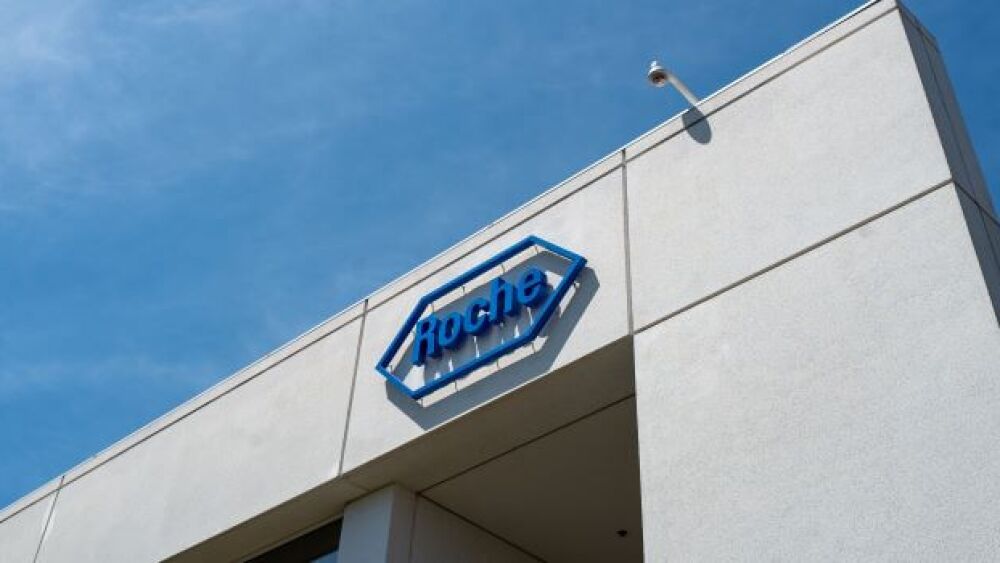Genentech (Roche) reported Wednesday that its Phase III SKYSCRAPER-01 trial failed to meet its co-primary endpoint of progression-free survival (PFS).
Courtesy Smith Collection/Gado via Getty Images
Genentech, a Roche company, reported Wednesday that its Phase III Skyscraper-01 trial failed to meet its co-primary endpoint of progression-free survival (PFS). However, the other co-primary endpoint, overall survival (OS), was immature at the first analysis, and the trial will continue until the next planned analysis.
The study is evaluating tiragolumab, an anti-TIGIT immunotherapy, plus the company’s anti-PD-L1 checkpoint inhibitor Tecentriq (atezolizumab) compared to Tecentriq alone as a first-line treatment for people with PD-L1-high locally advanced or metastatic non-small cell lung cancer (NSCLC). Numerical improvement was observed for both PFS and OS. The drug combination appears to be well-tolerated with no new safety signals when adding tiragolumab.
“While these results are not what we hoped for in our first analysis, we look forward to seeing mature overall survival for this study to determine next steps,” said Dr. Levi Garraway, M.D., Ph.D., chief medical officer and head of global product development for Genentech. “We continue to believe that TIGIT may have a role in cancer treatment and we will share additional results from our tiragolumab program as they emerge.”
TIGIT is a novel inhibitory immune checkpoint that suppresses the immune response to cancer. In preclinical studies, the drug appeared to act as an immune amplifier with other cancer immunotherapies. While distinct, the TIGIT pathway is complementary to the PD-L1/PD-1 pathway, which is the inhibitor immune checkpoint pathway affected by most immuno-oncology therapies to date. The hope is that by using both tiragolumab and Tecentriq, it might overcome immune suppression and restore the immune response.
This may be particularly bad news for Genentech and other companies working to develop anti-TIGIT checkpoint inhibitors. On March 29, Genentech reported on Phase III Skyscraper-02 trial of the tiragolumab and Tecentriq combination with chemotherapy as first-line therapy for extensive-stage small cell lung cancer (ES-SCLC). That study also failed to hit the co-primary endpoint of PFS. The co-primary endpoint of OS also was not met at the trial’s interim analysis, and the company indicated it was unlikely to hit statistical significance at the final analysis.
At that time, Garraway noted that the “outcome is disappointing as we had hoped to continue building on the advances of Tecentriq in extensive-stage small-cell lung cancer, which remains difficult to treat.”
Tiragolumab was granted Breakthrough Therapy Designation by the U.S. Food and Drug Administration in 2021 for the initial treatment of PD-L1-high metastatic NSCLC based on the data from the Phase II CITYSCAPE trial.
BeiGene and Novartis are also working to develop an anti-TIGIT therapy, ociperlimab. Others in the class include Merck’s vibostolimab, Arcus Biosciences’ domvanalimab, iTeos Therapeutics’ EOS448, Compugen’s COM902, Bristol Myers Squibb’s BMS-986207, Agenus Biosciences’ AGEN307 and others.
A report on the TIGIT market by Kuick Research noted that “Immunotherapeutic monoclonal antibodies have revolutionized the management of cancer over the past few years by demonstrating superior tolerability and major improvements in long-term survival. However, genomic analyses have revealed that several factors and multiple signaling pathways are involved in the development of cancer and other complex disorders. To enhance the efficacy of the treatment, researchers have also developed their effective counterparts, bispecific antibodies which have the ability to bind to two different antigens simultaneously.” The report goes on to specifically call out AGEN1777, developed by Agenus as a potentially first-in-class bispecific anti-TIGIT antibody.





